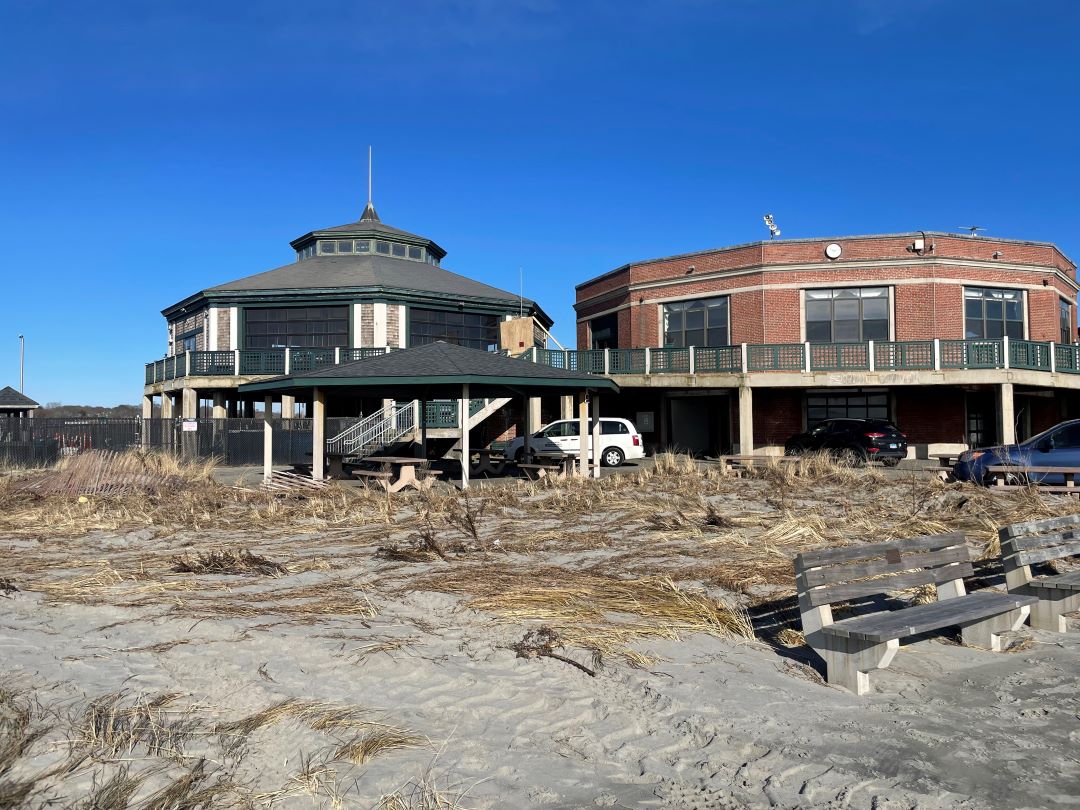R.I. Climate Efforts Need Communication, and a Generator
May 16, 2016
PROVIDENCE — When it reopens this month, Maria’s Seaside Café will be the last of 29 Westerly beachfront businesses damaged by Hurricane Sandy to resume business.
The occasion coincides with the release of a new report by a House commission that looks at the economic threats of sea-level rise and flooding in Rhode Island. The study was one of several adaptation and mitigation responses to the 2012 “superstorm” that hammered Westerly and the state’s southern coast. The storm was part of a series of naturals disasters that hastened the creation of the state climate change council and the Resilient Rhode Island Act of 2014.
Rep. Lauren Carson, D-Newport, was inspired to investigate the economic impacts of climate change after seeing her street in Newport’s Point District awash in several inches of water during heavy rain showers and seasonally higher tides.
“In my neighborhood it’s still flooding. It floods all the time,” Carson said.
She soon discovered a communication divide between researchers, at-risk groups and policy leaders. To fix this communication breakdown, an 11-member commission representing a range of groups — commercial real estate, hospitality and tourism, and academia and scientific research — was created.
The commission’s work focused on the threats to $3.8 billion worth of flood-exposed property across the Ocean State. It looked at impacts to homes, businesses, historic buildings, and the fishing industry in Providence, Newport and Westerly. After six hearings, the commission approved five recommendations for helping businesses, homeowners, municipalities and the state adapt to flooding and sea-level rise.
The principal themes of the recommendations, Carson said, are “more training, more collaboration, more exchange of information, more knowledge.”
Here are the five main actions steps:
Flood-audit program. Similar to the state energy-audit program, a flood audit would evaluate the risks and offer solutions for lowering flood damage to the 15,380 properties in flood zones in Rhode Island. The audits would be free and could be funded through a fee on insurance premiums.
Mandatory training. To increase awareness among municipal decision-makers and business, the report suggests mandatory training about flooding and sea-level rise for local planning commissions, zoning boards and real-estate agents. Carson introduced a bill requiring planning and zoning boards to undergo such training every two years.
Hurricane barrier. Carson was most shocked to learn that the hurricane barrier on the Providence waterfront doesn’t have a backup generator. The report suggests asking Rhode Island’s members of Congress to seek funding for a generator for the Army Corps of Engineers, the operator of the Fox Point Hurricane Protection Barrier.
Post-storm support. Businesses need help after damaging storms, both financially and emotionally. Lisa Konicki, executive director of the Ocean Community Chamber of Commerce in Westerly, said property owners need onsite mental-health counseling to help with recovering, as well as with the stress of rebuilding and getting customers to know they still exist.
“They need to get a little more lovin’ that next season to tell the world that they are still open. … That we didn’t get wiped off the map,” she said.
Town-by-town review. The signs of sea-level rise are increasing and the economic risks need to be tracked, analyzed and prioritized with the help of state agencies. “The state needs to really embrace the concept of climate change and sea-level rise,” Carson said.
These recommendations go to the General Assembly for consideration for legislation and other policy initiatives.
“We need to think in concrete terms about what a higher sea level would mean to the specific businesses and properties along out coast that are the drivers of our economy, and make some real plans for protecting them and our state’s economic interests,” Carson wrote in a prepared statement.
Categories
Join the Discussion
View CommentsRecent Comments
Leave a Reply
Your support keeps our reporters on the environmental beat.
Reader support is at the core of our nonprofit news model. Together, we can keep the environment in the headlines.
We use cookies to improve your experience and deliver personalized content. View Cookie Settings




I agree! Onsite mental health services are badly needed post storm. It makes no sense to rebuild year after year when your business is on the dune or in the surf zone.